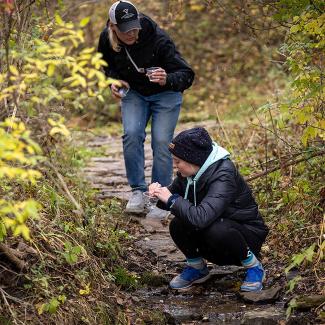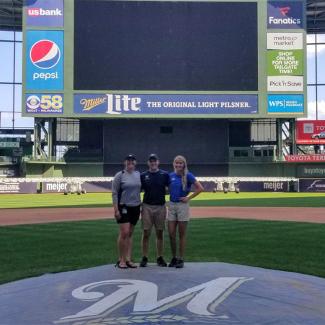What you'll learn about Ecological Restoration and Resource Management at UW-Platteville
The University of Wisconsin-Platteville’s School of Agriculture offers bachelor of science degrees in seven major areas, including environmental conservation degrees. As a recognized world leader for our undergraduate programs in agriculture, we offer a diverse selection of clubs and organizations, as well as several nationally competing teams, opportunities to apply classroom theories to on-campus science laboratories, a greenhouse, 430-acre university farm, and robust internship program.
Reclamation is primarily the practice of restoration and management of lands disturbed in the process of utilizing the earth's natural resources, which makes it a distinct profession. Although a large part of reclamation involves restoration of highly disturbed lands, a significant portion deals with natural landscapes, agricultural lands, industrial and urban lands, as well as wetlands.
The Ecological Restoration and Resource Management program leverages UW-Platteville’s strengths in engineering, agriculture, and the physical sciences.
To learn more about the Ecological Restoration and Resource Management programs, review the four-year plan for the biological emphasis and technical/physical emphasis or view the fact sheet.
Careers in Ecological Restoration and Resource Management
Environmental science, conservation, and reclamation professionals use their knowledge and skills to monitor one or more aspects of the environment, investigate issues, and seek to remediate sources of contamination or pollution. There are many possible career paths for people interested in environmental conservation and reclamation. Many involve conducting inspections using monitoring equipment; collecting, analyzing, and testing samples of soil, water, or air; preparing reports; and verifying compliance with environmental regulations.
Some of the many careers you could pursue with an environmental reclamation degree include:
- Cartographer
- Conservation scientist
- Construction manager
- Emergency response manager
- Environmental compliance officer
- Environmental engineer
- Environmental remediation specialist
- Environmental scientist
- Geoscientist
- Health and safety engineer
- Hydrologist
- Microbiologist
- Mining and geological engineer
- Natural sciences manager
- Photogrammetrist
- Public relations specialist
People who choose the environmental remediation and reclamation field may work for large, multinational corporations focused in the architectural or engineering industries; nonprofit organizations; consulting firms; or state, local, or federal government agencies.

Discover by Doing
In addition to classroom instruction in environmental conservation courses, students in the Ecological Restoration and Resource Management program at UW-Platteville learn practical skills through hands-on service-learning projects, research, internships, and university events. The Fire and Water Lab is our teaching and research lab, where students research ways to restore and manage degraded lands in Wisconsin.






